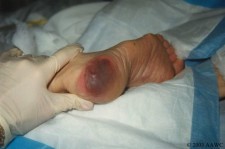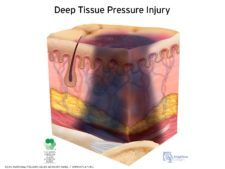How to Discover Deep Tissue Injury; Suspect the Unexpected

You may have heard the term ‘suspected deep tissue injury’ before without understanding what a deep tissue injury is and its implications in terms of wound management. If you have never heard the term before, or just need a quick review to refresh your memory, here is a brief description of deep tissue injury.
What is a suspected deep tissue injury?
The National Pressure Ulcer Advisory Panel (NPUAP) defines a suspected deep tissue injury as:
- Intact or non-intact skin with localized area of persistent non-blanchable deep red, maroon, purple discoloration or epidermal separation revealing a dark wound bed or blood filled blister.
- Pain and temperature change often precede skin color changes.
- The area may be preceded by tissue that is painful, firm, mushy, boggy, warmer or cooler as compared to adjacent tissue.
A deep tissue injury may be difficult to detect in people with darker skin tones.
What are the implications of a suspected deep tissue injury?
The problem with deep tissue injuries is that they are often misclassified and mismanaged. They often extend far deeper into the underlying tissue than may be initially suspected. They can evolve rapidly, exposing deeper tissue layers even when treatment is optimal.
[Tweet “The problem with deep tissue injuries is that they are often misclassified and mismanaged.”]
This is why NPUAP redefined the categories of pressure ulcer in 2007, adding the ‘suspected deep tissue injury’ and the ‘unstageable pressure ulcer’ categories. It was hoped that the addition of these categories would permit more accurate staging of pressure injuries. And it’s working to an extent- nurses and other healthcare professionals are now being educated on deep tissue injuries and the proper classification of pressure injuries.
Prompt identification and treatment of deep tissue injury is crucial, as these pressure injuries can rapidly evolve into ulcers involving all tissue layers. Hospitals and other healthcare organizations are being held accountable for these types of injuries, which can mean loss of revenue and extended hospital stays.
How can suspected deep tissue injuries be prevented?
Prevention of deep tissue injuries involves the same principles used to prevent all pressure ulcers, namely:
- risk assessment– assessment of all patients for the potential to develop pressure ulcers using an approved, valid and reliable assessment tool; identification and documentation of risk factors that put patients at risk for developing a pressure injury; and implementation of preventive measures based on risk assessment
- skin care– daily skin assessment; use of appropriate skin cleansing and moisturizing agents; and prompt attention to patients who are incontinent, including appropriate incontinence products and use of barrier creams
- nutrition– identification of patients who are at risk for poor/malnutrition and nutritional support where appropriate
- offloading and support surfaces– identification of the appropriate surface for bed-bound and wheelchair bound patients; frequent turning using a turning schedule for bedbound patients; appropriate use of lifting devices; offloading devices as appropriate; and measures/practices to prevent friction and shear
- education– pressure injury prevention programs for healthcare workers, patients and caregivers/family members (NPUAP, 2007)
Education is perhaps the most important means of preventing deep tissue injuries. When we understand how pressure injuries occur, how to assess for their development, identify risk factors and understand how to mitigate these risks, and implement programs to prevent pressure ulcers, we will see far fewer of these devastating and highly preventable injuries.
To learn more about suspected deep tissue injuries and advanced wound care, consider taking our wound care certification course. All of our courses are offered online and provide 24/7 access. Register today!
Editors Note: This post was originally published in December 2007 and has been revamped and updated for accuracy and comprehensiveness.
Sources:
NPUAP Pressure Injury Stages http://www.npuap.org/resources/educational-and-clinical-resources/npuap-pressure-ulcer-stagescategories/Pressure Injury Prevention Points. NPUAP.org http://www.npuap.org/resources/educational-and-clinical-resources/pressure-ulcer-prevention-points/


Hello Laurie,
I have been one of your students in wound management course. Your materials, teaching strategy is very helpful and has provided a good training ground to enhance my learning experience. I would like to thank you and Bill for being very prompt with your responses whenever I ask for assistance. My learning experience with Wound Educators is incredible and I would recommend this to my friends.
Mary Grace G.
Thank you for your kind words. We are so pleased that you enjoyed the course!
Hello ms. Laurie,
I was your student 2013. I just passed the abwm cws exam 06/12/17 after take 2. I would like to thank you and Mr.swezey because until.now you still keep tracking us by updating us whatever New in wound care. I’m so glad I had chosen wound care educators on line class as my stepping stone to become a cws.
Hi Aida, Congratulations on passing the wound care certification exam. That is fantastic!!! Thank you for your kind words about our company.
hi I am shamim newly assigned for wound managment educator
Can I use your image of suspected deep tissue injury on the heel in a PPT presentation I am doing for Pressure Injury Prevention to staff at long term care facilities?
Hey Patricia,
If the presentation is not for profit purposes and for internal facility educational purposes only, we approve.
I have a dti on both sides of buttox and part of the thys. I went to the doctor reporting the pressure injury , and was told it was dry skin. I argued the point that it was indeed a pressure sore, yet was dismissed the doctor said those start out red. She said she had been a wound nurse over twenty years and who do you believe, her or doctor google? So here I am with what is surely STAGE 3 OR 4 DTI. Suicide seems like a good option at this point.
Rod,
We understand dealing with wounds can be both mentally and physically challenging. I highly recommend you get a second opinion from a certified wound specialist in your area – you can use ABWM certified directory to find a certified wound specialist in your area – https://abwmcertified.org/find-a-specialist/
You have ample support available both online and in-person. Please leverage your network and lean on them if you are struggling.